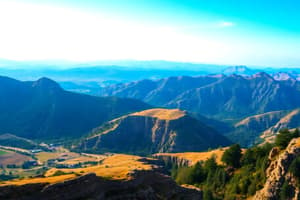Podcast
Questions and Answers
What does Physical Geography primarily study?
What does Physical Geography primarily study?
- Cultural practices and traditions
- Economic activities and trade
- Population demographics and trends
- Natural features and processes (correct)
Which concept in Geography refers to the exact coordinates of a location?
Which concept in Geography refers to the exact coordinates of a location?
- Regional characteristics
- Latitude and longitude (correct)
- Cultural features
- Relative location
What is the focus of Human Geography?
What is the focus of Human Geography?
- Examination of human activities and cultures (correct)
- Investigation of ecological processes
- Study of landforms and climate
- Analysis of physical landscapes
Which of the following tools is used in Geographical Techniques?
Which of the following tools is used in Geographical Techniques?
What does Environmental Geography analyze?
What does Environmental Geography analyze?
Which region is NOT considered one of the seven continents?
Which region is NOT considered one of the seven continents?
What key concept in Geography refers to the flow of people, goods, and ideas?
What key concept in Geography refers to the flow of people, goods, and ideas?
Which of the following is a major global issue discussed in Geography?
Which of the following is a major global issue discussed in Geography?
Flashcards are hidden until you start studying
Study Notes
Definition of Geography
- Study of the Earth's landscapes, environments, and the relationships between people and their environments.
- Explores spatial relationships and patterns in both physical and human phenomena.
Branches of Geography
-
Physical Geography
- Focuses on natural features such as landforms, climate, vegetation, and ecosystems.
- Examines processes like erosion, weathering, and natural disasters.
-
Human Geography
- Studies human activities, cultures, economies, and their relationships to the environment.
- Analyzes urban development, migration, and population distribution.
-
Geographical Techniques
- Utilizes tools like Geographic Information Systems (GIS), remote sensing, and cartography.
- Involves spatial analysis and data visualization.
Key Concepts in Geography
-
Location
- Absolute: Exact coordinates (latitude and longitude).
- Relative: Location in relation to other places.
-
Place
- Characteristics that define a location, including physical features and cultural attributes.
-
Region
- Areas defined by common characteristics (e.g., physical, cultural, political).
-
Movement
- The flow of people, goods, and ideas across space.
-
Human-Environment Interaction
- Examines how humans adapt to and modify their environments.
Important Physical Features
- Continents: Asia, Africa, North America, South America, Antarctica, Europe, Australia.
- Oceans: Pacific, Atlantic, Indian, Southern, Arctic.
- Major Landforms: Mountains, plains, plateaus, valleys, deserts, and rivers.
Population Geography
- Studies the distribution, density, and demographics of populations.
- Analyzes trends such as urbanization, aging populations, and migration patterns.
Environmental Geography
- Examines the relationship between human activities and environmental changes.
- Discusses sustainability, conservation, and the impact of climate change.
Cultural Geography
- Studies the geographical aspects of cultures, including language, religion, and traditions.
- Analyzes how culture influences spatial dynamics and landscapes.
Economic Geography
- Focuses on the distribution of economic activities and resources.
- Examines trade patterns, industrial locations, and agriculture.
Key Global Issues
- Climate change and its geographical impacts.
- Urbanization and its effects on cities.
- Globalization and cultural exchange.
- Resource management and sustainability challenges.
Methodologies in Geography
- Field studies, surveys, and case studies.
- Use of statistical and qualitative analysis.
- Mapping and spatial analysis techniques.
Definition of Geography
- Studies Earth's landscapes, environments, and human-environment interactions.
- Explores spatial relationships and patterns in physical and human phenomena.
Branches of Geography
-
Physical Geography
- Focuses on natural features like landforms, climate, vegetation, and ecosystems.
- Examines processes such as erosion, weathering, and natural disasters.
-
Human Geography
- Analyzes human activities, cultures, economies, and their environmental relationships.
- Looks into urban development, migration, and population distribution.
-
Geographical Techniques
- Employs tools like Geographic Information Systems (GIS), remote sensing, and cartography.
- Involves spatial analysis and data visualization for understanding geographical data.
Key Concepts in Geography
-
Location
- Absolute location uses exact coordinates (latitude and longitude).
- Relative location describes a place's position concerning other locations.
-
Place
- Defined by physical characteristics and cultural attributes unique to a location.
-
Region
- Areas characterized by common physical, cultural, or political features.
-
Movement
- Encompasses the flow of people, goods, and ideas across space.
-
Human-Environment Interaction
- Studies how humans adapt to and alter their environments.
Important Physical Features
- Continents: Asia, Africa, North America, South America, Antarctica, Europe, Australia.
- Oceans: Pacific, Atlantic, Indian, Southern, Arctic.
- Major Landforms: Includes mountains, plains, plateaus, valleys, deserts, and rivers.
Population Geography
- Focuses on the distribution, density, and demographics of populations.
- Analyzes urbanization, aging trends, and migration patterns.
Environmental Geography
- Investigates the interplay between human activities and environmental changes.
- Discusses principles of sustainability, conservation, and climate change impacts.
Cultural Geography
- Explores geographical aspects of cultures, including language, religion, and traditions.
- Analyzes the influence of culture on spatial dynamics and landscapes.
Economic Geography
- Examines the distribution of economic activities and resources.
- Investigates trade patterns, industrial locations, and agricultural practices.
Key Global Issues
- Climate change and its widespread geographical impacts.
- Urbanization and its implications for cities and societies.
- Globalization fostering cultural exchanges and economic integrations.
- Resource management challenges and sustainability initiatives.
Methodologies in Geography
- Incorporates field studies, surveys, and detailed case studies.
- Utilizes both statistical and qualitative analysis techniques.
- Employs mapping and spatial analysis for data representation and understanding.
Studying That Suits You
Use AI to generate personalized quizzes and flashcards to suit your learning preferences.




